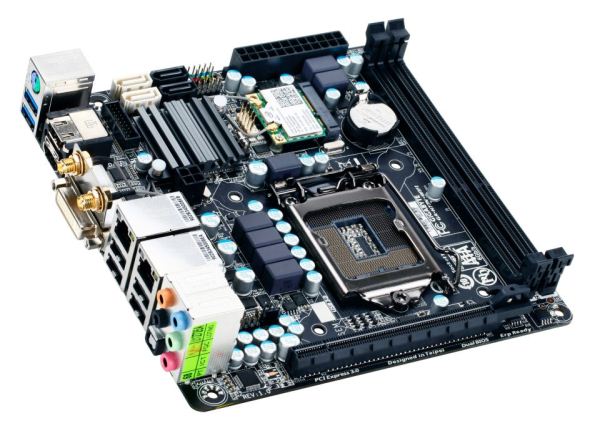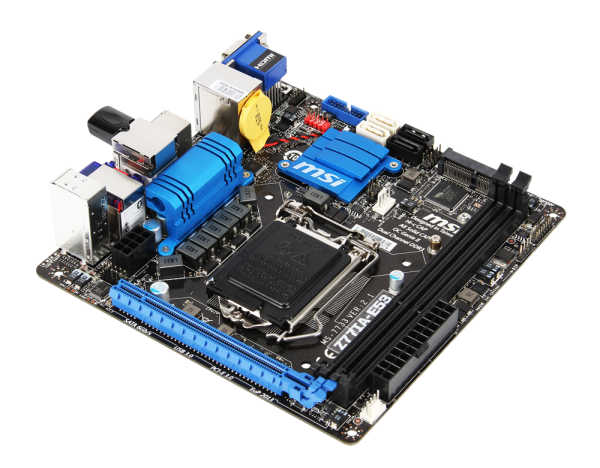Two New Z77 mITX Announced
by Ian Cutress on August 23, 2012 7:17 AM EST- Posted in
- Motherboards
- MSI
- Gigabyte
- mITX
Over the past couple of days, two new Z77 mini-ITX motherboards have been seen on the radar. The first is Gigabyte's Z77N-WiFi model, to be released alongside the H77N-WiFi equivalent.
Gigabyte have migrated the Z77 chipset to the top of the board, as seen by the chipset heatsink and the SATA/mPCIe slot. The power delivery is devoid of cooling - judging by the mounting on the board this is how it will ship. Oddly enough for a mITX we get dual gigabit Ethernet, both Realtek, combined with a Realtek ALC892 audio chip. The placement of the USB 3.0 header is a little odd being towards the rear, as well as the SATA ports. The main criticism may come due to the socket area, where should users wish to pair this board with a beefy GPU, the CPU will be limited in air cooler size. Looks like All-In-One coolers may be preferential here. Estimates state that this board will cost around $140 at release.
The other mini-ITX to enter the market comes from MSI in the form of the MSI Z77IA-E53. We snapped this motherboard back at Computex, but now it comes to full release.
In a similar layout to the Gigabyte, we get the Chipset up top, along with the SATA ports and USB 3.0 header. With the MSI we get a free mSATA port and WiFi/Bluetooth at the rear. Chipset heatsinks also make an appearance, as well as a full 8-pin CPU power connector. Though similarly to the Gigabyte, the CPU socket is near the PCIe slot. No word on release or pricing as of yet.
These two motherboards will join the three Z77 mini-ITX already on the market from Zotac, ASRock and ASUS. Not to mention that EVGA will also join the mini-ITX party soon with their own board hopefully arriving next month. Out of these six, I have two in for review and hope to get as many of the others as possible. Would you prefer them reviewed one-by-one or all at the same time? What are you looking for in a mini-ITX motherboard? Let us know in the comments.


















43 Comments
View All Comments
MadAd - Friday, August 24, 2012 - link
I would like ITX hardware to include- displayport
- DTS Connect
- full fan control (all headers)
- eSATA
In a review I would like to see the performance of:
- closed Loop coolers (cool-it, H80 etc) doing double duty as cpu cooler and case fan
- native multi monitor ability
- 2400 compatibility tested
- integrated graphics test (incl temps and noise)
- power consumption, thermals and noise at 0%, 50% and 100% load
In Anandtech forum:
- a forum dedicated to SFF/ITX, currently its pointless posting because its instantly drowned out by 100 posts a day asking what gaming laptop is best or what kind of battery life X laptop should have.
Simon42 - Friday, August 24, 2012 - link
Well I've been waiting for that review for months. I finally pulled the trigger on the pricey Asus board and I would have liked to read about it... but I'm sure I won't be disappointed. I couldn't bring myself to buy another board with inferior BIOS options and general capabilities. It's going inside a sub-10L custom case and I can't wait.What I would like to learn about in a review is how the fans behave, what kind of support we have inside Windows (with the manufacturer's software suite and with generic tools like SpeedFan - some boards offer 0 control) and what the fans do outside of Windows. A Linux compatibility report would be nice too, because some exotic or cheap solutions are not gonna work there (I'll have to do the OS X testing myself, but Linux/XMBC behaviour would be interesting).
Another thing I want to find out about is the 35W and 45W modes the Asus board seems to be able to run under - that should make it all quiet and cold when needed.
theNiZer - Friday, August 24, 2012 - link
I just want to second the SpeedFan test for fan control, even though the ASUS boards are only controllable by the asus fan xpert software (which is okay since it is the most advanced fan software made by a mobo maker - other programs suck IMHO).For testing: please use a small gaming case like the SilverStone Sugo SG05 or the BitFenix Prodigy with a discrete top performing (heating) graphics card, and make noise measurements: this way the effect of the fan control can be tested .
Simon42 - Friday, August 24, 2012 - link
Well that's exactly why I'm asking! This board size is ideal and most likely to be used to run XBMC or make a turbo Mac Mini equivalent - but if the fans become loud and uncontrollable outside of Windows, well it's kind of a waste. Equivalents to SpeedFan exist under Linux and Mac OS and they rely on the same connections to control the fans. If Asus' amazing fan control makes them broken in other OSes, it sucks. I'd love to know what kind of fan tuning the different UEFI/BIOSes allow and how much one can rely one it when the manufacturer's app can't be used.nicolasitx - Friday, August 24, 2012 - link
Aspects that count most in my choice of a mini-ITX motherboard are:* the sound quality of the integrated sound device. With only one pci express extension port, users should probably choose between a discrete graphical card (game setup or media center) or an HBA like the LSI SAS 9207 (file server setup). Can a PCIe sound card be used in a mini-ITX setup ? If the integrated sound device will remain for this setup, it should be good !
* connectivity (usb, sata, TH). Devices not integrated on the motherboard may be added thought usb or thunderbolt connections. A dedicated board with additional ports would take the only PCIe slot. Minimun for mini-ITX is 3x sata, 1x eSata, 8x usb (2.0 or 3.0). TH would be the most promising.
* under-clocking: My target build is full-featured of connectivity and integrated options, with everything kept cool by running the unlocked cpu at a lower frequency, like some i5-S or i5-T. For this I need some under-clocking option to run my 3570K like a 3570T.
* over-clocking: in the BIOS, may I change the frequency and Turbo boost, up or down, with Z77 or H77 chipset. This be depend how each motherboard implement that option.
* under-clocking and over-clocking must be compatible with Sandy Bridge cpu (locked, unlocked ?)
* cpu cooling and socket placement: can I attache a Noctua NH-L12 or a Scythe Big Shuriken2 revB on top of the CPU ? I favor silence over speed. For various socket placement, what cooling configuration can be the most efficient for the noise. Blocking the PCIe port is not an option, I need my dGPU or HBA extension card.
* RAM compatibility: can you test at least two brands of memory, with various 16Go setup
* water-cooling: Are some kits of water-cooling small enough to fit in mini-itx configurations ?
* Dual monitor setup must be easy when you only use iGPU.
* Precise automatic fan control : at least 2 (one for cpu, one for case)
* No noise
Arnulf - Friday, August 24, 2012 - link
Who cares about the sea of x86 based ITX boards which all require substantial cooling and are an overkill for the media PC niche where said format is most often used. What I want to see are affordable something-ITX boards based on APQ8064 and similar chips, offering more than enough performance for desktop work in a lower thermal profile than that of an Atom or Brazos based system.mgrier - Friday, August 24, 2012 - link
I would gladly pay a premium for a board with an Intel NIC rather than Realtek.spynoodle - Saturday, August 25, 2012 - link
For me, built-in WiFi and Bluetooth is a major feature. This isn't something that I would particularly require if I were to build my own Mini-ITX rig, but as a perspective system-builder, it makes things a lot easier to configure.yor1001 - Sunday, August 26, 2012 - link
I'd love to see onboard raid performance vs discrete raid performance. (Been wanting to set up a backup server with one of these boards).Also I think its best to review all boards at once, in which case it would make it a lot easier for comparison.
Chufft - Friday, September 7, 2012 - link
I'm looking to build a small, efficient, quiet and powerful DAW. I hope you'll test latency. A round-up sounds like a great way to discuss the form factor in terms of how it's evolving and how various makers view its potential.(BTW new here. Made my living with Macs in the '90s, back into computing now that I've got the DAW bug. Terrific site & user community -- congratulations!)